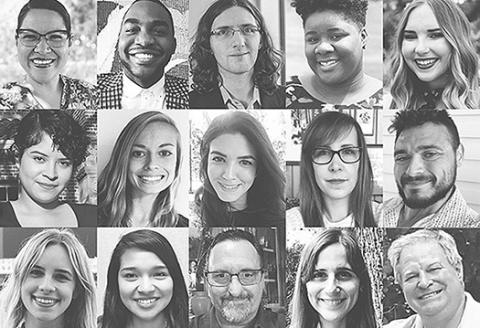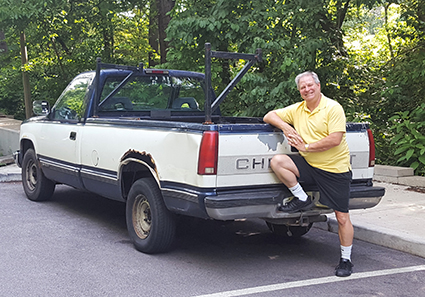Innovative Training at the Intersection of Social Work and Criminal Justice

The Institute for Justice Research and Development (IJRD), housed within FSU’s College of Social Work, recently launched a unique Post-Master’s Fellowship designed to prepare the profession of social work to practice and research with criminal justice-involved adults and their families.
A first of its kind, the Post-Master’s Fellowship is the only fellowship in the nation which provides Master’s level social workers with in-depth, hands-on training opportunities with criminal justice-involved individuals and families. Fellows develop specialized and highly sought-after skills which provide an excellent foundation for the next steps of their career.
Preparing the workforce of the future, IJRD leadership provides Fellows with intensive training, workshops, and resources throughout the three-year tenure to help Fellows develop professionally as both clinicians and researchers.
The inaugural class of 16 Fellows started work Friday, June 14. Fellows were drawn from 12 universities across the nation and selected from a pool of nearly 100 applicants. All Fellows are recent Masters of Social Work (MSW) graduates.
This inaugural class of Post-Master’s Fellows will work on the 5-Key Model for Reentry project, helping test an innovative reentry intervention with incarcerated men and women as they leave prison and return to their families and communities. The 5-Key Model is a reentry services approach that was built by formerly incarcerated individuals, practitioners, and researchers and was grounded on a review of thousands of program evaluations conducted with criminal justice-involved and non-criminal justice involved study samples. The five keys to reentry success are Healthy thinking patterns, Meaningful work trajectories, Effective coping strategies, Positive social engagement, and Positive interpersonal relationships. The 5-Key Model focuses on the strengths and psychological well-being of formerly incarcerated individuals to ensure they will remain crime free and contribute positively to society.
Post-Master’s Fellows pursue either the Clinical Practice or the Research track.
- Clinical Practice Fellows are prepared to lead and engage in intervention work with criminal justice-involved populations. Clinical Practice Fellows will spend the majority of their time providing individual and group intervention sessions, crisis intervention, service delivery, and outreach to currently and formerly incarcerated individuals.
- Research Fellows are developed as social work researchers, administrators, and leaders. Research Fellows enroll criminal justice-involved individuals into research studies, conduct face-to-face personal interviews with participants to administer behavioral health measures and clinical assessments, engage study participants in long term research involvement, and identify policy barriers to success and strive toward policy innovations.
Post-Master's Fellow Highlight: Bill Rone
All of the Post-Master’s Fellows are passionate about working with criminal justice-involved individuals and helping them to thrive after their release from prison, but one Fellow, in particular, has a unique story that makes him a perfect fit for this opportunity.
Bill Rone graduated with an MSW from the Brown School of Social Work at Washington University in St. Louis in May of 2019. Rone identifies as a recovering addict and was incarcerated three times over the course of his life for drug crimes. He recently celebrated nine years of sobriety and was released from prison for the last time on June 23, 2011.
Currently, Rone works with the Prison Education Project in St. Louis, a program based on the Bard Prison Initiative run by Bard University in New York. In this role, Rone develops reentry content for incarcerated individuals completing an Associate’s degree during their incarceration. He was also one of the founding members of the Community Liaison Board at Washington University in St Louis and served on the Board of Directors (comprised exclusively of formerly incarcerated members), helping to connect individuals and service providers after they were released from incarceration and worked with a non-profit organization that provided a comprehensive service model to formerly incarcerated individuals.
“I am interested in working with justice-involved adults because I am one. I want and need to help those going through what I went through and I see a part of me in each and every person I work with,” Rone explains. “Three tenets guide my life: Help those most in need, be a part of the solution not a part of the problem, and honor the memory of my parents. The Post-Master’s Fellowship allows me to help individuals get out and stay out of the incarceration cycle and honestly, words cannot adequately describe how that feels to me.”
Rone exemplifies the mission of IJRD and the goal of the Post-Master’s Fellowship – to provide opportunities to formerly incarcerated men and women and to leverage their unique life experiences to expand the reach of IJRD’s research and impact in the community.
These fellowships are made possible with the support of the Charles Koch Foundation (CKF), one of IJRD’s longtime supporters. Learn more about each of the incoming Post-Master’s Fellows below, and about IJRD support from CKF here. Learn more about each of the incoming Post-Master’s Fellows below.
Clinical Practice Fellows
- DeVont’e Arrington, MSW
- Keyasia Downs, LSW
- Leticia Martinez, MSW
- Steven Pepper, MSW
- Bill Rone, MSW
- Taylor Russell, BSW
- Bianca Schindeler, BSW
- Solomon Shepherd, MSW
- Sydney Smith, MSW
Research Fellows
- Connie Conway, MSW
- Kimberly Furcron, BSW
- Francis Furmanek, MSW
- Sara Julian, MSSW
- Sara Moegenburg, MSW
- Silvia Obregon, MSW
- Nicole Thompson, MSW

